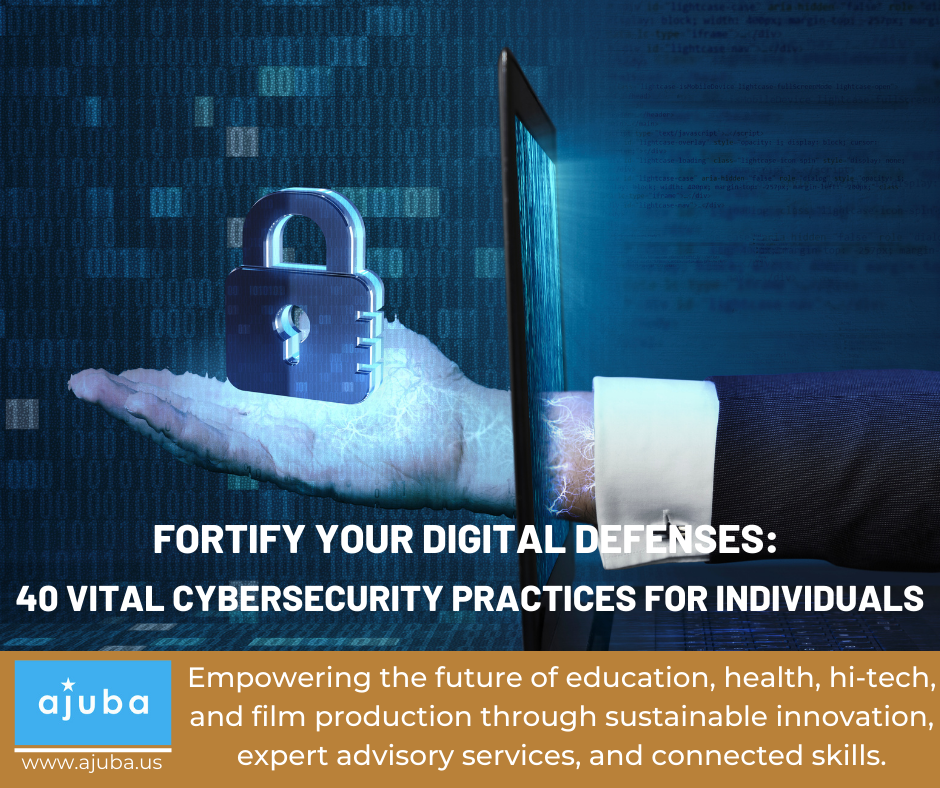Article #21 | October 8th, 2023
In an era defined by digital connectivity, personal cybersecurity has never been more critical. The cyber landscape is rife with threats, from malicious hackers seeking to compromise your data to deceptive phishing attempts that aim to steal your identity. As technology advances, so do the tactics of cybercriminals, making it essential for individuals to arm themselves with knowledge and practice vigilant cybersecurity measures. In this article, we present “Fortify Your Digital Defenses: 40 Vital Cybersecurity Practices for Individuals.” Discover the key steps you can take to safeguard your online presence, protect your personal information, and navigate the digital world securely. Whether you’re a seasoned tech enthusiast or just embarking on your digital journey, these practices will help you build a robust shield against the ever-present threats in the virtual realm.
General Online Behavior:
- Keep Software Updated: Regularly update your operating system, antivirus software, and applications to patch vulnerabilities.
2. Use Strong, Unique Passwords: Create complex passwords and use a password manager to store and manage them.
3. Enable Multi-Factor Authentication (MFA): Use MFA wherever possible to add an extra layer of security.
4. Beware of Phishing: Be cautious of unsolicited emails, links, and attachments, and verify the sender’s authenticity.
5. Secure Your Wi-Fi: Use strong encryption and a unique password for your Wi-Fi network.
6. Avoid Public Wi-Fi: Limit sensitive transactions on public Wi-Fi networks; use a VPN for added security.
7. Log Out: Always log out of accounts, especially on shared or public computers.
Social Media and Online Identity:
8. Review Privacy Settings: Regularly review and adjust privacy settings on social media platforms.
9. Limit Personal Information: Avoid oversharing personal details like your birthdate, address, and phone number.
10. Use Caution with Friend Requests: Only accept friend requests from people you know and trust.
11. Use Strong Authentication: Enable strong authentication on your social media accounts.
Email Security:
12. Verify Email Senders: Always double-check email sender addresses for legitimacy.
13. Use Secure Email Services: Choose secure email providers with encryption options.
Online Shopping and Banking:
14. Shop on Secure Sites: Only use secure websites for online shopping, and check for “https://” in the URL.
15. Use Credit Cards: Prefer credit cards over debit cards for online transactions; they offer better fraud protection.
16. Check Statements: Regularly review your bank and credit card statements for unauthorized transactions.
Device Security:
17. Use Lock Screens: Enable lock screens, PINs, or biometrics on your devices.
18. Encrypt Devices: Encrypt your smartphones and other devices for data protection.
19. Install Antivirus Software: Use reputable antivirus software on all your devices.
20. Backup Data: Regularly backup important data to an external source or cloud storage.
Safe Downloading and File Sharing:
21. Avoid Untrusted Sources: Download software and files only from reputable sources.
22. Scan Downloads: Use antivirus scans on downloaded files before opening.
Social Engineering and Scams:
23. Be Skeptical: Be cautious of unsolicited phone calls, especially if they request personal or financial information.
24. Verify Requests: Verify requests for money or information with the alleged sender through a separate communication channel.
Children and Family Safety:
25. Educate Children: Teach children about online safety, including not sharing personal information and not talking to strangers online.
26. Use Parental Controls: Implement parental controls on devices and limit screen time for children.
Privacy Protection:
27. Use a VPN: Consider using a virtual private network (VPN) to protect your online privacy.
28. Regularly Clear Cookies and Cache: Clear your browser cookies and cache regularly.
29. Review App Permissions: Review the permissions requested by mobile apps and limit them to what is necessary.
Secure Remote Work:
30. Secure Home Office: Implement security measures at home for remote work, including secure Wi-Fi and device encryption.
Password Management:
31. Use a Password Manager: Utilize a reputable password manager to generate and store complex passwords.
32. Change Default Passwords: Change default passwords on devices and routers.
Email and Messaging Apps:
33. Use Encrypted Messaging: Use messaging apps with end-to-end encryption for sensitive communications.
Awareness and Education:
34. Stay Informed: Keep yourself informed about current cybersecurity threats and best practices.
35. Take Online Courses: Consider taking online cybersecurity courses to enhance your knowledge.
Traveling:
36. Secure Devices: Secure your devices and data when traveling, including using a VPN and disabling auto-connect to public Wi-Fi.
37. Beware of Public Computers: Avoid using public computers for sensitive transactions or accessing personal accounts.
Data Disposal:
38. Securely Dispose of Devices: Properly wipe and dispose of old devices to prevent data breaches.
Backup Security:
39. Protect Backups: Ensure that your backup devices and accounts are secure since they contain your data.
40. Report Suspicious Activity: Report any suspicious online activity or cybercrimes to the relevant authorities.
By following these best practices, individuals can significantly reduce their risk of falling victim to cybercrime and enhance their overall online security. Cybersecurity is an ongoing effort, and staying vigilant is key to protecting your digital life.

Baljit Singh is an accomplished Founder & CEO with a proven track record in building successful businesses in manufacturing and services companies. With expertise in leadership and general management, Baljit has developed and implemented business strategies, led sales and marketing functions, and built motivated teams in turn-around environments. Author of the Book, “My Experiments with Innovation,” he is a motivational speaker and gives talks on how to cultivate habits and change lifestyle to drive innovation. Baljit is currently driving cross border partnership between India-Israel-North America.
Website: www.ajuba.us
Email: bsingh@ajuba.us
